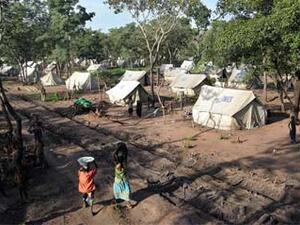Chad: New Central African arrivals confirmed
Chad: New Central African arrivals confirmed
A UNHCR team, accompanied by officials from the Chadian government's refugee agency, the Commission Nationale d'Accueil et de Réinsertion des Réfugiés (CNAR), visited a village on the Chadian border at the weekend and discovered that several hundred refugees from the Central African Republic (CAR) have crossed the border in the last few days.
UNHCR believes that 150 to 200 persons are currently present in Komba village. The local authorities, however, are reporting that a total of 467 people crossed the border last week following an attack on Markounda in northern CAR on Tuesday (27 September). Other inhabitants from Markounda apparently fled elsewhere in northern CAR.
Refugees interviewed by UNHCR in Komba said that they crossed the Nana-Markounda river, which forms the border between the two countries in that area. The refugees have so far been receiving food and shelter from the local population.
A second UNHCR/CNAR mission is scheduled to go to Komba today to see if there have been any more new arrivals, and to make a further assessment of the situation. The team will also conduct new interviews with refugees to see whether they wish to remain in the volatile border area, or would like to be moved to Amboko camp, which already hosts some 24,000 CAR refugees. Some of the newly arrived refugees told UNHCR staff at the weekend that they expect to return to CAR soon in order to harvest their fields.
The attack on Markounda involved unidentified armed men and CAR military forces. Markounda used to have a population of some 15,000 inhabitants, but continual unrest over the past three years has forced the majority of the inhabitants to leave the city. Most have gone to Chad. Many of them have been hosted in Amboko camp, six kilometres from the main town of Goré in south Chad. At the time of the attack, around 1,000 inhabitants were reportedly still living in the city.
At the same time, UNHCR is continuing the repatriation movements of some 1,500 Chadians from CAR to south Chad. The third convoy arrived in south Chad on Saturday, bringing 417 new people from Boubou camp in CAR to the transit centre in Amboko camp before taking them back to their villages of origin a few days later. This movement brings the total number of Chadians we have repatriated from CAR since mid-September to 976. The final convoy is scheduled to leave CAR this Wednesday and should arrive in Goré, the main city in south Chad on Friday. This group of refugees had been living in CAR for two decades and had integrated with the local population, developing their own sustainable activities such as cotton cultivation. But the continued security problems in northern CAR, which have intensified since December 2004, led them to ask UNHCR to help them repatriate to their country of origin.


